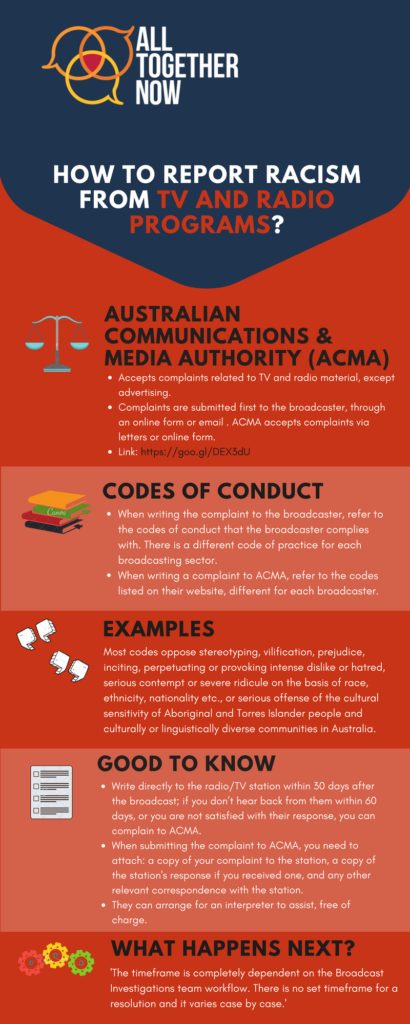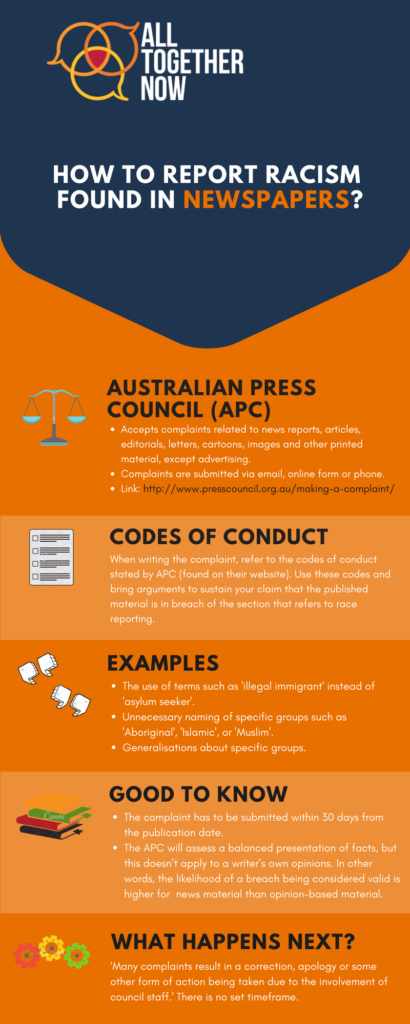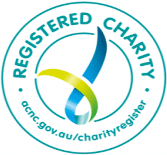What can I do?
All Together Now has put together some infographics on how to report racism in newspapers (PDF) and TV and radio programs (PDF).
 |  |
TV and radio programs
You will need to start by making a complaint directly to the TV/radio station within 30 days of the program being aired. If you don’t hear back from them within 60 days, or you believe their response is inadequate, you can then escalate your complaint to the Australian Communications & Media Authority (ACMA), being sure to include your complaint to the station.
Newspapers
The Australian Press Council (APC) accepts complaints about news reports, opinion pieces, cartoons, and other print media except advertising, within 30 days of the first publication of the piece.
Take your case to a federal or state court
Any matter related to racism can be reported to the Australian Human Rights Commission (AHRC) or other state anti-discrimination bodies. You can click here for more information about how to make a complaint to the AHCR or to a state body.
After you have done that, in some cases it might be possible for you to take your case to court. As court procedures can be complicated and vary greatly from state to state, we recommend that if you wish to seek redress through the court system, you first seek advice from your nearest Community Legal Centre and/or Legal Aid to get further assistance on how and to whom you should make a complaint.
Before making the decision to start a court procedure, it is important to keep in mind that these procedures can be quite costly and lengthy. If this does not seem to be the best option for you, there are alternative dispute resolution methods available at anytime.
Go to the police
In some cases, a racially discriminatory act will constitute a crime and can be reported to the police. Which acts constitute a crime will vary depending on the state or territory you are in. If you wish to go to the police, we advise that you consult with a lawyer or your local police station first.
Make a complaint to the Islamophobia Register
In addition to the above legal and institutional reporting options, if the incident was Islamophobic you might also consider sending a complaint to the Islamophobia Register. Making a report to the Islamophobia Register ensures that incidents of Islamophobia and Anti-Muslim sentiments are securely recorded and analysed to build a body of knowledge about Islamophobia in Australia.
Research
In December 2017, All Together Now published the “Who Watches the Media?” report, which analysed how race is portrayed in Australian opinion media. To prepare the report, All Together Now worked with the University of Technology Sydney (UTS) to monitor and collect data published by Australia’s four most read online newspapers (The Australian, Daily Telegraph, Sydney Morning Herald, Herald Sun), and the four most watched TV current affairs programs (A Current Affair, The Project, 60 Minutes, 7:30).
In total, 62 out of 124 race-based opinion reports collected during the six-month sample period express racist views through their title, content, a picture, and/or tone of voice. This is very concerning as previous research demonstrates that the language the media uses to describe racial backgrounds, and the portrayals the media uses to depict racial backgrounds, impacts on attitudes towards race. Furthermore, a person can be personally discriminated in the media, if he or she is portrayed in a negative way because of his or her ethnicity, race or national/religious background.
The law
As explained by the Race Discrimination Unit of the Australian Human Rights Commission, the Racial Discrimination Act makes it unlawful to insult, humiliate, offend or intimidate another person or group in public on the basis of their race. As the media (including the internet) is one means by which words, sounds, images and writing are communicated to the public, the legislation clearly applies to this medium.
To protect freedom of expression, however, the legislation sets out certain circumstances in which the prohibition will not apply, as long as the person or media service has acted reasonably and in good faith. First, if the communication is part of an artistic work it is not unlawful. Another exception are academic and scientific works and debates or comments on matters of public interest. The media are a third exception to allow fair and accurate reporting on any matter of public interest. This last exception enables the media to report on public issues, such as racial incitement or racially offensive conduct. It also allows for editorial opinions and social commentary, as long as they are published in good faith.


